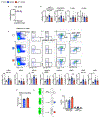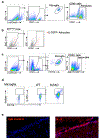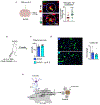Astrocytic interleukin-3 programs microglia and limits Alzheimer's disease
- PMID: 34262178
- PMCID: PMC8934148
- DOI: 10.1038/s41586-021-03734-6
Astrocytic interleukin-3 programs microglia and limits Alzheimer's disease
Abstract
Communication within the glial cell ecosystem is essential for neuronal and brain health1-3. The influence of glial cells on the accumulation and clearance of β-amyloid (Aβ) and neurofibrillary tau in the brains of individuals with Alzheimer's disease (AD) is poorly understood, despite growing awareness that these are therapeutically important interactions4,5. Here we show, in humans and mice, that astrocyte-sourced interleukin-3 (IL-3) programs microglia to ameliorate the pathology of AD. Upon recognition of Aβ deposits, microglia increase their expression of IL-3Rα-the specific receptor for IL-3 (also known as CD123)-making them responsive to IL-3. Astrocytes constitutively produce IL-3, which elicits transcriptional, morphological, and functional programming of microglia to endow them with an acute immune response program, enhanced motility, and the capacity to cluster and clear aggregates of Aβ and tau. These changes restrict AD pathology and cognitive decline. Our findings identify IL-3 as a key mediator of astrocyte-microglia cross-talk and a node for therapeutic intervention in AD.
© 2021. The Author(s), under exclusive licence to Springer Nature Limited.
Conflict of interest statement
Competing interests
C.S.M., F.K.S., and R.E.T. are inventors on a patent application filed by Mass General Brigham that describes targeting IL-3 signaling in Alzheimer’s disease (invention record no. 2020-568). B.P.K. is an inventor on patent applications filed by Mass General Brigham that describe genome engineering technologies and methods, is an advisor to Acrigen Biosciences, and consults for Avectas Inc. and ElevateBio.
Figures















Comment in
-
Astrocytic IL-3 could help microglia protect against Alzheimer disease.Nat Rev Neurol. 2021 Sep;17(9):525. doi: 10.1038/s41582-021-00546-0. Nat Rev Neurol. 2021. PMID: 34321636 No abstract available.
References
Publication types
MeSH terms
Substances
Grants and funding
- R00 HL151750/HL/NHLBI NIH HHS/United States
- R00 CA218870/CA/NCI NIH HHS/United States
- R35 GM139598/GM/NIGMS NIH HHS/United States
- P01 HL131478/HL/NHLBI NIH HHS/United States
- R01 CA158534/CA/NCI NIH HHS/United States
- R35 HL135752/HL/NHLBI NIH HHS/United States
- K99 HL151750/HL/NHLBI NIH HHS/United States
- R35 HL139598/HL/NHLBI NIH HHS/United States
- R01 HL158534/HL/NHLBI NIH HHS/United States
- R13 CA135752/CA/NCI NIH HHS/United States
- F31 HL147364/HL/NHLBI NIH HHS/United States
- P01 HL142494/HL/NHLBI NIH HHS/United States
LinkOut - more resources
Full Text Sources
Other Literature Sources
Medical
Molecular Biology Databases
Research Materials

